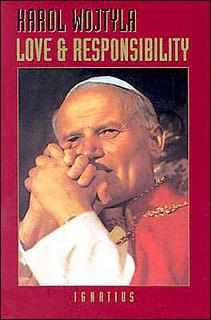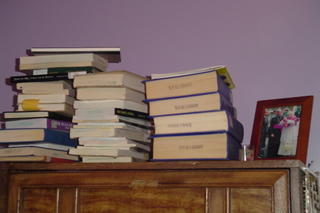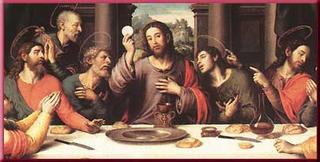
This past weekend I've been working on a book review of "Love and Responsibility" by Karol Wojtyla for a Christian Moral Theology course I'm taking this semester. We were actually supposed to write our review on our course text but I asked if I could write it on "Love and Responsibility" since this is one of the books that has most impacted my own life and it is a text which is very relevant to the renewal of Catholic Moral Theology. I honestly believe that this is a text which can transform lives and it has clearly made a significant contribution to the development and clarification of Church teachings on human sexuality over this past century. This is a text which speaks of the revelation of Truth found in the human person and in the Body of Christ. I thought I'd share with you some excerpts from my essay.
"Wojtyla introduces the ethics of human sexuality through a discussion of the personalistic norm which defines a person as "an objective entity, which as a definite subject has the closest contacts with the whole (external) world and is most intimately involved with it precisely because of its inwardness, its interior life (Wojtyla 29)." (. . .) According to this understanding of the human person, the intellect, by which we know Truth, and the will, by which we choose the good, enable us to love. Because we have the ability to choose the good we are moral beings with a conscience and because we have the capacity for this inner life we are an objective being but also subjective in relation to others. According to Wojtyla, if our morality is a result of our anthropology, and our anthropology is made sense of in terms of love, so will our morals be made sense of in terms of love."
"Love includes a profound usefulness of the other person, but it does not treat the other person as a means to an end. It is only when humans come together in pursuit of a common good, that is in communion, that we are capable of making use of each other in a manner that is loving."
"Just as our of love Christ chose to espouse humanity, so too, a human act is based on a freewill choice to love another person."
"According to Wojtyla "love is the unification of persons" and thus man can only truly love through uniting himself to another through the gift of self. Furthermore, since persons are willed by God for their own sake, the only adequate response toward another person is love."
"Wojtyla goes on to point out that beyond even the philosophical dimension, the sexual urge has a religious dimension since the man and woman cooperate with God in creating new life."
"Sexual pleasure must always be subordinate to love between persons, for affirmation of the value of the person is the essence of love."
"According to Wojtyla, "sexual morality is within the domain of the person" and "it is impossible to understand anything about it without understanding what the person is, its mode of existence, its functioning, its powers."(18) "
"Through his [Karla Wojtyla's] work in philosophy and theology and his experiences as a confessor and counsellor he was convinced "that the Church's sexual ethic, properly interpreted, contained essential truths that deepened human happiness when they were faithfully lived out (Witness to Hope. Weigel 141)."
"Wojtyla sought to shift the Church's position to one of positive rather than negative morality and thus helped equip the Church to face the debates surrounding sexual morality in the modern world."
"In a culture of moral relativism, this text brings great hope and lays the foundation for a recognition of the dignity of human sexuality."
"Speaking directly to the human experience, this is a text which speaks in a very intimate and personal way into the life of every child of God."
"In this text Wojtyla argues that because of our freedom, we are responsible as persons for whether or not we truly love."
In other words, I highly recommend this book to anyone and everyone. It speaks of the Truth of the human condition and thus is a book that is relevant to all people, whether they are Catholic, Christian, Muslim, Jewish, atheist, or anything else. . . This, the first book published by the late Pope John Paul II, is a must read.
If you take the time and effort to read it, it may change your perception of human life and it certainly will challenge you.







